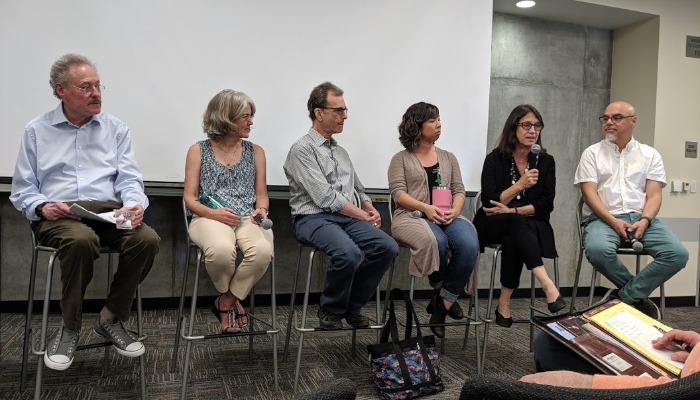
Telling Stories that Matter: Literary Journalism Workshop Panel. From left to right:
Barry Siegel, Amy DePaul, Miles Corwin, Erica Hayasaki, Amy Wilenz, and Hector Tobar.
The room was packed with over one hundred people interested in the art of storytelling–not bad for niche conference scheduled for 1:00 pm. on a hot SoCal Saturday afternoon. We’d gathered to learn about a new project from the UCI School of Humanities called the Center for Storytelling.
Professor Barry Siegel opened the event by describing the organization’s vision: to demystify the activity of writing and help the local community tell their stories. The Center for Storytelling has lofty goals, including raising $500,000 and building a Storytelling Lab, complete with recording technology and member-access to storytelling experts.
Siegel then joined a panel with five other colleagues to share their thoughts on both storytelling and writing. I’ve attempted to capture much of their storytelling wisdom.
On writers:
“Anyone who says that they love writing, probably isn’t a good writer.” Amy W.
“Writers are oddballs. Social outcasts.” Hector
“Writers are shy egomaniacs.” Miles ← the line of the day!
“I never met a great storyteller that wasn’t a big reader.” Miles
“If you steal from enough writers, you’ll develop your own style.” Hector
On becoming a better writer:
“You learn the most about writing by reading.” Barry
“To write you need nerve, will, and discipline.” Barry
“To be a storyteller, you must read stories like a writer.” Miles
“Read the masters.” Hector
“If you want to learn how to write a crime novel, read a good one and a bad one. You’ll learn more about structure from the bad one because good novels hide the mechanization.” Miles
Hector pointed to The Gettysburg Address as his benchmark for great writing: It’s short (265 words), powerful, and to the point.
On writing:
“Writing is a messy process that starts with flinging mud. Your first draft will be mud.” Barry
“It’s better to rely on excess in the first draft.” Hector
“Don’t start writing too soon.” Miles in response to question about writer’s block
Research…“If you don’t pay in the front end, you’ll pay in the backend.” Miles
“Have a schedule. I write a thousand words a day. No more. No less.” Miles
On interviewing:
“Be boring so that your subject can be interesting.” Amy W
“When interviewing a survivor, remember that they were a normal person first.” Hector
“Interviewers are like therapists that tell the world what they hear.” Hector
“Interviewing is like dating. It’s accelerated levels of intimacy.” Erica
On the impact of writing:
“When you’re reading The Silence of the Lambs and your heart starts pounding, remember that a writer did that to you.” Amy W
“People read to know what happens.” Hector
On storytelling:
“Look for moments that become scenes.” Erica
“People make stories interesting.” Miles
“People’s motivation must be on every page.” Hector
“Story begins with a world that you are interested in.” Erica
“Writing a story is a marathon. First you need to run around the block.” Hector
“Know your ending.” Hector